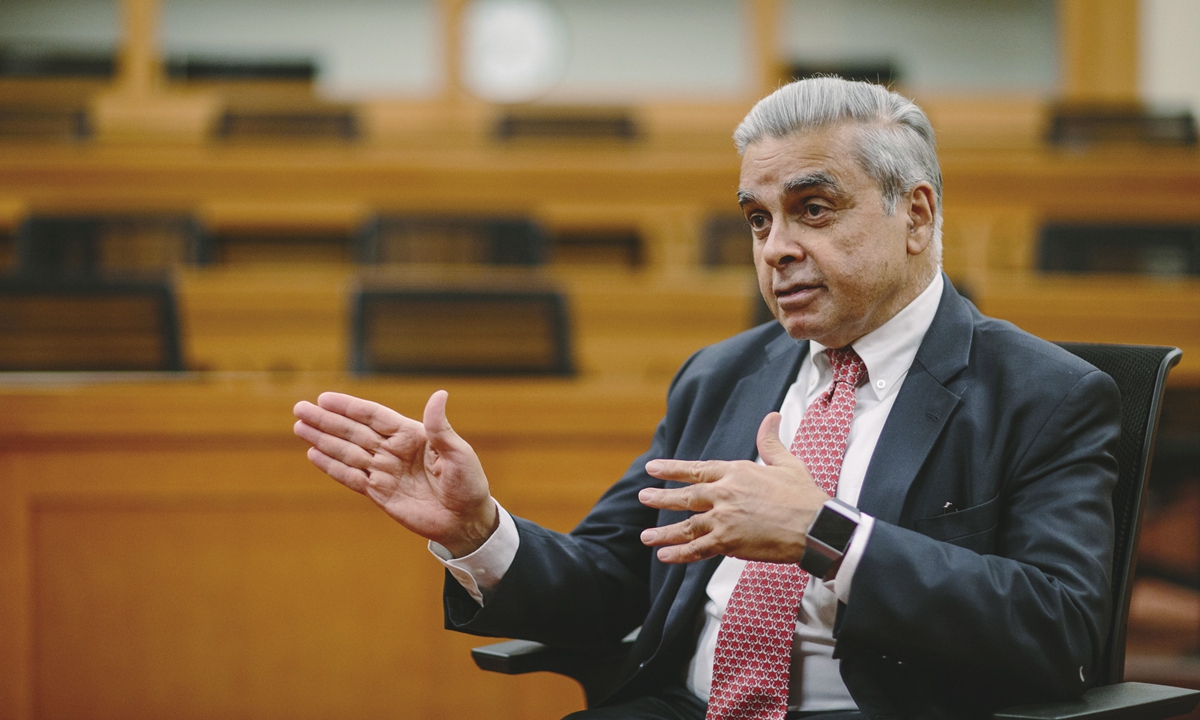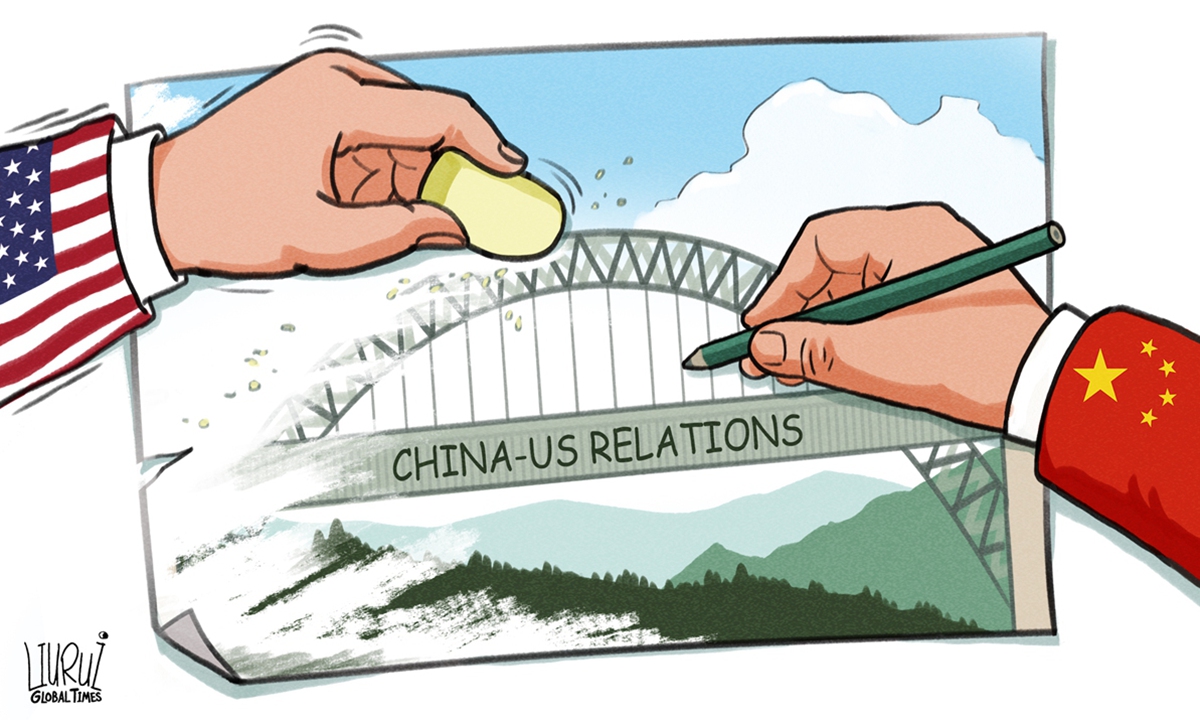Biggest danger to Biden from Trump, not China: Kishore Mahbubani

Kishore Mahbubani Photo: Li Hao/GT
Washington today lacks "sophisticated, long-term thinking on geopolitical issues," said Kishore Mahbubani, Singaporean political scientist and distinguished fellow at the Asia Research Institute, National University of Singapore. He said Biden should adopt a different policy from the Trump administration toward China and instead of pursuing to maintain US "primacy," it should focus on improve the livelihoods of the American people. Below is the full transcript of Mahbubani's exclusive interview with Global Times reporter Yu Jincui and Bai Yunyi, in which he shared his insightful views on a wide range issues concerning China and the US.
GT: July marks the 50th anniversary of Henry Kissinger's visit to China. The ice-breaking trip ended the isolation between China and the US. Looking back at history, what should we learn the most from that historical experience, especially when China-US relations are in such a worrying situation at present?
Mahbubani: There's no doubt that Kissinger's visit to China in July, 1971, was pathbreaking. It taught the world a very important lesson. When you have two great powers, like the United States and China, especially two great powers that had major misunderstandings and indeed had fought a direct war, the Korean War, in the early 1950s, the fact that despite all this painful history, Henry Kissinger went to China was, I think, a great historical breakthrough. The big lesson it taught the world was that great powers should always talk to each other. No matter what differences you may have, no matter how bad your history has been, you must talk to each other.
Of course, not all the differences and tensions between the United States and China were resolved by one visit. However, by talking face-to-face, the understanding improved between the two countries. That was the big breakthrough. There's no doubt that Kissinger's visit to China in July, 1971, changed the course of world history. Therefore, I hope that at a time like today, when many differences remain between the US and China, they will continue talking to each other
GT: But we hear many US political analysts say there's no "panda hugger" now in Washington. So we would like to ask, will there be another political figure like Kissinger to help break ice with China?
Mahbubani: The problem in the US is not that there are no panda huggers. The problem in the United States is that there are no longer big strategic thinkers, like Richard Nixon and Henry Kissinger. Richard Nixon and Henry Kissinger had big geopolitical minds. They could look at the whole world and understand that the whole world was a complex chessboard. Therefore, they had to move all the pieces very carefully. While today, what you have in Washington, DC is a massive amount of intellectual laziness. This intellectual laziness was a result of Francis Fukuyama's essay "The End of History," which reduced everything to being black or white. Right or wrong. But the world today is very complex. Instead of the end of history, you're seeing the return of history.
What is truly shocking is the lack of historical knowledge of many major American strategic thinkers. They don't seem to understand that the unipolar moment the US enjoyed for the last 30 years was an aberration. We are now returning to a multipolar world, which will be a much richer world. However, it does mean that the United States will have to learn to play a much more intelligent game globally. That's what Richard Nixon and Henry Kissinger could do. That's what's missing in Washington, DC today: the lack of sophisticated, long-term thinking on geopolitical issues. Some American thinkers see this. Andrew Bacevich, the President of Quincy Institute, has said "The monumental arrogance and ignorance prevailing in the inner circles of power have led Americans to misapprehend their place in the global order."
Therefore, the real problem in Washington, DC today is that there are no more Henry Kissinger-type figures. Instead you have simplistic thinking. They do not see different shades of grey in Washington, DC. That's the fundamental problem that the United States has today. You saw this, by the way, during the G7 meeting. President Biden said this was a contest between Democrats and Autocrats. That's an example of black and white thinking. This doesn't make sense anymore, because the world today is such a complex place. You have so many different forms of government. Every country has got to find its own form of government. The idea that every country should either have a white solution or a black solution is an example of unsophisticated thinking, which is very dangerous.
GT: Some Chinese scholars now argue that a "post-Kissinger mind-set" has started to take root in Washington, which aims at turning the China-US-Russia triangle into a new China-US-India triangle - further roping New Delhi in to contain Beijing. How do you see this view?
Mahbubani: Actually the concept of a triangle is very Kissingerian. It's not surprising that Washington, DC is now trying to create a China-US-India triangle. The US is trying to use India to counterbalance China. Certainly the United States' interests would be helped a lot if India joined the triangle and worked on behalf of the United States of America. I can see how United States would gain from this triangle. However, I don't see how India would gain from this triangle. India would be much better off being a strategically independent or autonomous actor. India would have more room for strategic maneuver if it has good ties with Washington, DC and good ties with Beijing. Even though, in many ways, India has moved closer to the United States, its leaders also emphasize that India still maintains good relations with Russia, China, and other third world countries. As a result, it will not be a simple new China-India-US triangle.
GT: Biden's China policy is considered to be a continuation of Trump's. You said in a column for the Financial Times in April that Biden should summon the courage to reverse course on China. What kind of reaction has this article caused, especially in Washington?
Mahbubani: I want to emphasize one thing at the outset: The Biden administration is a huge improvement over the Trump administration. The Trump administration used to make very insulting speeches about China. If you remember the speeches given by vice president Mike Pence, secretary of state Mike Pompeo, and even President Trump, when he referred to the COVID-19 as a China virus, Wuhan virus, those were very insulting speeches. The Biden administration is much more polite. This is a very good thing.
GT: But he's coordinating more concrete actions against China with his European allies.
Mahbubani: There's no question that President Biden has not reversed course on some fundamental aspects of Trump's China policy. He has kept up the trade war, leaving tariffs and sanctions in place. It is interesting that when Joe Biden was campaigning in 2019 in the elections campaign, he said that Trump's tariffs and sanctions on China had not worked. Instead, they had hurt American farmers, American consumers, American workers. Biden was right when he said this. A trade war is never good. A trade war does not help the United States. Yet, despite this, President Joe Biden cannot reverse course on China. Why not? As I explain in my book Has China won?, a massive anti-China consensus has developed in Washington, DC. It would be very, very difficult for Joe Biden to reverse course.
When you ask me, what reaction did my FT article receive in Washington, DC, I can tell you that some of the more sophisticated thinkers in Washington, DC told me privately that my article was right. There are some thoughtful people in Washington, DC, who understand that this strong anti-China campaign is not hurting China and not helping America. As a result, I've been asked to write more articles for American publications, explaining why the Biden administration should adopt a different policy towards China.
GT: If the Biden administration cannot reverse the current course on China, what impact will it have on US-China relations and the world?
Mahbubani: There's no question that over the next decade, the US-China contest will continue to gain momentum. However, even as United States steps up its campaign against China, it will find that very few countries in the world want to join an all-out campaign against China. You saw this even at the G7 meeting. Even though some European countries paid lip service to the campaign that the US is carrying out against China, in private they expressed many reservations. For many European countries, like Germany, the China market is a bigger market for German cars than the American market. Hence, Germany would be shooting itself in the foot if it joined the campaign against China. The Biden administration will certainly try to step up its campaign against China. However, it will find that very few countries will enthusiastically join this campaign against China.
GT: In your book Has China Won?, you said today's America is behaving like the Soviet Union, and China is behaving like America. That's very interesting. Is the American political system still supple and flexible enough to make necessary adjustments to formulate China policy that is in the best interest of the US?
Mahbubani: I'm glad you raised this issue, because the purpose of my book Has China Won? was to be helpful to both US and China. I'm a friend of both US and China. The reason why I said that United States was behaving like the Soviet Union, is because when I was doing the research for my book, I came across a statement made by another great strategic thinker that America used to have. His name is George Kennan. George Kennan was known for his containment policy against the Soviet Union. But he also was very subtle and sophisticated thinker. And this is what he said -- he said that America's standing in the world relative to that of the Soviet Union would depend on its ability to "create among the peoples of the world generally the impression of a country which knows what it wants, which is coping successfully with the problems of its internal life and with the responsibilities of a world power, and which has a spiritual vitality capable of holding its own among the major ideological currents of the time." There are four limbs to his statement: The United States must know what it wants; it is coping successfully with its internal problems, coping successfully with global responsibilities and has a spiritual vitality. Four limbs.
In the contest between the United States and Soviet Union, United States was ahead on all four counts. The Soviet Union was behind. Today, between China and the United States, China is ahead on the four counts. And the United States is behind. The United States is therefore not listening to the advice of one of its greatest strategic thinkers in not taking care of its "spiritual vitality".
One key point I emphasize in my book is that United States is the only major developed country where the average income of the bottom 50 percent has gone down over 30-year period. The primary focus of the Biden administration should therefore be to improve the livelihood of the American people.
The US therefore faces a critical choice: does it want to maintain its "primacy" or improve the livelihood of its people? It has to make a strategic choice. It would be wiser for the United States to improve the wellbeing of its people and focus less on primacy. There's no point having the world's largest military if your own people are suffering. At the end of the day, the biggest danger to the Biden administration doesn't come from China. It comes from Donald Trump. If Donald Trump wins in 2024, then clearly the Biden administration would have failed. That's why Biden should focus on improving the livelihoods of the bottom 50 percent of American people to make sure that Donald Trump doesn't come back. That's how my book is trying to help the American people and also help the Biden administration.
GT: What do you think of the recent series of offensives launched by the US against China over the origins of the coronavirus? Without new proof, why has the Biden administration once again made an issue of the "lab leak?"
Mahbubani: The one good thing about science is that scientific evidence cannot be tampered with by politicians. Therefore when it comes to scientific evidence, we should let the scientists deal with it. I have absolute confidence that if the World Health Organization, which is trusted by most countries in the world, sets up a scientific panel, then the scientific panel will find the right answers to scientific questions. However, when politicians decide to get involved in science, that's very dangerous. They tend to politicize scientific issues. Scientific evidence is best left to scientists. Recently, I watched an interview with a Dutch member of the WHO team that went to China. She said on BBC that if the Biden Administration has new evidence on the origins of the virus, it should share that scientific evidence. That evidence has not been shared.
To enhance the credibility of the World Health Organization, every country should agree to allow WHO teams to visit their country and assess their facilities. It's not fair to say that China should allow access, and other countries should not allow access. Therefore, the United States should declare that it is willing to allow WHO teams to access any facilities in the United States. In that way, the United States will set an example for others to follow.
I am making this point because sometimes with other issues like human rights, the United States supports investigation of human rights situations in other countries. However, the United States doesn't support investigation of human rights situations within the United States. It's important to allow multilateral organizations complete independence to make investigations. And we should respect the decisions of multilateral organizations.

Illustration: Liu Rui/GT
GT: Do you think the narrative launched by the United States on the origins of COVID-19 is kind of propaganda war? Will the propaganda war be more frequent in the future, in the next few years between China and the US?
Mahbubani: As part of this US-China geopolitical contest, it is inevitable that the United States, in an effort to maintain its number one status, will do what it can to undermine the standing of China in the world. For example, in the Cold War, President Ronald Reagan famously called the Soviet Union an evil empire. That was a very successful propaganda assault on the Soviet Union. So it would be quite natural for the United States to try and do the same with China. But the problem is that it is not likely to succeed. In the Cold War between the United States and Soviet Union, more countries traded with the United States than they did with the Soviet Union. Today, more countries trade with China than they do with the United States. So many countries have had a direct experience of China. When American officials paint a black-and-white picture of China, most foreigners are not convinced. They have been to China. They have seen China. They know that all flawed propaganda descriptions of China do not match the reality of China. This is something which I have also documented in detail in my book Has China Won?, which will be published in Chinese in China by CITIC press by July 2021.
GT: Amid the US increasing crackdown and containment on China, China's diplomatic style is also considered to become tough. Some even put the label "wolf warrior" on Chinese diplomacy. As a veteran diplomat, how do you see the changes in China's diplomatic style and in China's diplomatic discourse? Does the Chinese government intend to send some signals through this diplomatic change?
Mahbubani: The procedures of insulting other countries were started by the Trump administration. As I mentioned earlier, the speeches given by Vice President Pence, by Mike Pompeo, were very rude, insulting speeches. I was very disappointed that the European countries, which know better the art of diplomacy, didn't publicly criticize the Trump administration for violating the basic rules of diplomacy and giving such insulting speeches. It's always unwise to insult other countries.
Hence, when the European countries complain about "wolf warrior" diplomacy, they should ask themselves why they have double standards. Why didn't they say anything against the "wolf warrior" of the Trump administration? Why were they so silent?
At the same time, having been a diplomat for 33 years, I know that diplomacy succeeds best when you don't insult other countries. Indeed, the definition of a diplomat is someone who can tell you to go to hell in such a way that you feel that you're going to enjoy the journey to hell. Diplomacy is about subtlety and sophistication. The most effective diplomats are those who avoid insulting other countries and instead always talk politely. So the United States, therefore, should announce that it is no longer going to repeat the "wolf warrior" diplomacy of the Trump administration. It should also call for a more civilized dialogue among all countries. Every country should abide by the same rules. No country should be allowed to insult other countries. Here's an important fact about our times. The only country that insults China publicly is the United States of America. It's very unwise for the United States to insult China.
GT: You once said the US underestimated the Communist Party of China's resilience and advised the West not to expect the collapse of the CPC. Where do you think the resilience of the CPC come from? What's the biggest misjudgment about the CPC in the West? Can the West overcome prejudice to truly understand the CPC?
Mahbubani: The biggest misunderstanding of the CPC in the West comes from its failure to realize that the CPC has improved the standard of the living of the Chinese people more in the last 40 years, than any other Chinese government has in 4,000 years of Chinese history. 800 million Chinese people have been rescued from absolute poverty. China now has a middle class of 300 to 400 million people. Sadly, many in the West don't understand how much the CPC has done. Fortunately, there has been a recent study done by the Harvard Kennedy School Ash Center for Democratic Governance and Innovation on the CPC. On the basis of a rigorous academic and peer reviewed research process, it showed how support for the Chinese government among the Chinese people has gone up from 86 percent in 2003 to 93 percent in 2016.
This is a credible American academic study. Another big mistake that the United States is making is that it doesn't understand that the Communist Party of China has changed and adapted in many significant ways. Hence, for example, the Chinese Communist Party is one of the most meritocratic political parties in the world. It selects the best people to join the party. This is absolutely unknown to many Americans. They don't understand how the CPC has changed and adopted. Also, if you judge the CPC by its performance, in terms of how much it has improved the livelihood of the Chinese people, there is no question that it has done a tremendous job. I believe that's why it remains popular within China.
What I've just said is unknown to many Americans. They believe (and I'm not exaggerating here), that the only reason why the CPC is in power is because it is suppressing the Chinese people. That's what Americans believe. They don't understand that actually the situation is the opposite. The CPC is in power because it has improved the livelihood of the Chinese people and continues to enjoy the support of the Chinese people.
GT: How do you assess the possibility of war or a regional military clash between China and the US in the next 10 to 20 years? Which one would you choose between impossible, probable but unlikely and very likely?
Mahbubani: I would say that prospect of a war between China and United States is unlikely, but not impossible. It can happen, if the United States doesn't understand how sensitive the issue of Taiwan is in US-China relations. After Kissinger's visit, there was an understanding (and especially after the establishment of diplomatic relations), that the United States would maintain official ties with Beijing and unofficial ties with Taiwan. This understanding should never be broken.
GT: If a military clash between China and the US happens, how will other countries like Russia react?
Mahbubani: Most countries would not want to get involved in a war between China and the United States. Let me add that such a war is very unlikely. In a nuclear war between two nuclear powers, you don't have a winner and a loser. You have a loser and a loser. So both China and the United States would lose several cities in a nuclear war. That's why a war would be absolutely crazy. This is also why other countries will not get involved in a nuclear war between China and the United States.
Photos
Related Stories
- U.S. fails to recognize its own human rights' violations, says senior UN advisor
- Xenophobic targeting of US minorities unpalatable
- One killed, 12 injured in U.S. multiple shootings
- Study points to possible earlier COVID-19 infections in U.S.
- China firmly opposes interferences in internal affairs by U.S., EU: spokesperson
Copyright © 2021 People's Daily Online. All Rights Reserved.










